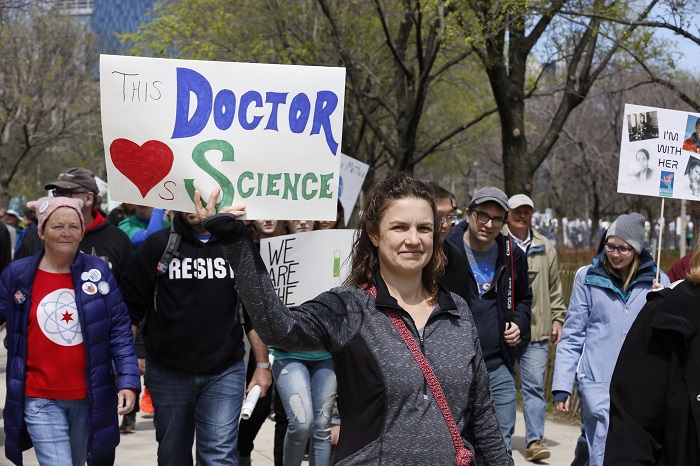Thousands protest anti-science policies worldwide
Published : 23 Apr 2017, 02:38

Tens of thousands of scientists and their supporters took to the streets in Washington, D.C. and around the world on Saturday to protest against what organizers described as an "alarming" anti-science trend.
The main March for Science event was held in Washington, D.C., where thousands, mainly scientists, engineers, teachers, students, parents and children, defied pouring rain to gather at the National Mall to hear high-profile speakers who declared science under attack and asked politicians to respect facts.
"We are marching today to remind people everywhere our lawmakers especially of the significance of science for our health and prosperity," Bill Nye, a popular U.S. science educator and CEO of the Planetary Society who served as honorary co-chair of the event, told the crowd at the rally that lasted about four hours followed by a march to the U.S. Capitol.
"Today, we have a great many lawmakers, not just here but around the world, deliberately ignoring and actively suppressing science," Nye asserted. "Their inclination is misguided and in no one's best interest."
Out in the crowd, worries were expressed straightforwardly in the signs and banners held by the participants that read: "Science, not silence," "Oceans are rising, and so are we," "Fund Science = Fun Future," "Policy without science is a Biohazard," "Science is not a partisan issue, it is the foundation of our society," "Science is NOT an opinion."
"I'm here because I want to make sure climate change is a major focus of policy in the near history of our government," Emily Wiggans, a middle-aged woman who came with her family, told Xinhua. "I think we really need to focus on a present danger as a national security threat and do more with climate scientists and put more funding into climate scientists and science."
Another woman, Ray Whittle, was outraged about President Donald Trump's proposed budget, which would slash funding for the U.S. medical research funder, the National Institutes of Health (NIH), a federal agency her son was working for.
"His budget is a disaster. I'm terrified he is going to cut NIH funding. There is lots of scientific work being done out there right now. I think that we have to put our money where our people are lost," Whittle told Xinhua, holding a poster board with the words: "Disease kills more people than terrorism. Fund medical research."
Another marcher, Dominique Hall, who described herself as a public health scientist, also did not hesitate to express her disbelief.
"I'm just disappointed because the current administration is so strongly against science and because the country is looking to too much alternative facts to deny science," Hall said.
"I worked on science since graduate school for the past five years, and both my parents work for government agencies, and it (science) has always been part of my life."
Besides the Washington march, organizers said there are 609 "satellite" marches across the United States and across the world in a protest timed to coincide with Earth Day.
In a statement, Trump insisted that his administration is committed to protecting the environment "without harming America's working families."
"That is why my Administration is reducing unnecessary burdens on American workers and American companies," he said. "Rigorous science is critical to my Administration's efforts to achieve the twin goals of economic growth and environmental protection...(but) we should remember that rigorous science depends not on ideology, but on a spirit of honest inquiry and robust debate."

